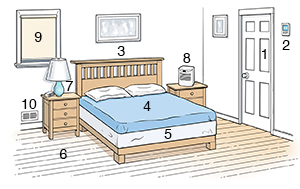Many people with asthma are allergic to dust mites. Dust mites are tiny bugs that live in warm, damp places. They are too small to see. Dust mites aren't parasites. They don't bite or sting. They're found in nearly every home. They live in mattresses, pillows, upholstered furniture, and house dust. Dust mite allergy can cause asthma flare-ups and nasal allergy symptoms. If you have this allergy, there are many steps you can take to control dust mites at home.
Take these steps to control dust mites in your bed and bedroom:
-
Keep all clothing in a closet, with the door shut.
-
Make sure the room isn't too humid. It should be below 50% humidity.
-
Choose wood, leather, or vinyl for furniture instead of upholstery.
-
Wash all bedding, pillows, and stuffed toys in hot water (130°F/54.4°C) every week. Dry them in a hot dryer. Remove any items that can't be washed.
-
Use special covers on pillows, mattresses, and box springs. These covers are made for people with allergies.
-
If you can, replace carpeting with tile or hardwood flooring. Use washable throw rugs. Or don't use rugs at all.
-
Dust furniture with a damp cloth at least once a week.
-
Use an air conditioner or a dehumidifier to reduce humidity and filter the air. Clean the filter often.
-
Use pull-down shades or vertical window blinds that can be easily cleaned. Use these instead of curtains or drapes.
-
Use filters over heater vents.


